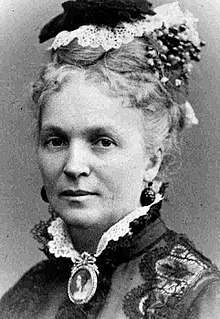Clara Jessup Moore
Clara Sophia Jessup Bloomfield-Moore (February 16, 1824 – January 5, 1899)[1] was an American philanthropist and philosopher.
Clara Jessup Moore | |
|---|---|
 | |
| Born | Clara Sophia Jessup February 16, 1824 Westfield, Massachusetts |
| Died | January 5, 1899 (aged 74) London |
| Nationality | American |
| Spouse(s) | Bloomfield Haines Moore |
Biography
She was born in Westfield, Massachusetts. She married businessman Bloomfield Haines Moore (1819-1878) and resided in Philadelphia from the date of her marriage onward.[2] Following the death of her husband she moved to London, where she eventually died in 1899.[3] She organized in Philadelphia a hospital relief committee during the American Civil War and assisted in the foundation of the Temperance Home for Children.
She and her husband had three children: Ella Carlton Moore (1843–1892), Clarence Bloomfield Moore (1852–1936), Lilian Stuart Moore (1853–1911).
Philosophy
Her books on etiquette connected the perennial philosophy to social behavior; for instance, she described harmony as the basis of good manners: "the secret or essence of good manners, as of goodness in all other things, consists in suitableness, or in other words of harmony." She promoted a "science of social intercourse" consisting of "the means through which people meet each other, maintaining harmony and peace in their relations, and securing the greatest possible amount of pleasure and comfort to all." This philosophy was subsequently applied to physics. Her book on ether was written because she believed that ether could account for the operation of the motor invented by John Ernst Worrell Keely, to whose Keely Motor Company she gave liberally in order that he might develop his idea.
Selected works
- Miscellaneous Poems (1875)
- On Dangerous Ground (1876), a romance
- Sensible Etiquette (1878)
- Ether the True Protoplasm (1885)
- Social Ethics and Social Duties (1892)
References
- King, Margaret J. (1979). "Clara Sophia Jessup Bloomfield-Moore". In Mainiero, Lina (ed.). American Women Writers: A Critical Reference Guide from Colonial Times to the Present. 1. New York: Frederick Ungar Publishing Co. pp. 181–83.
- Clara Moore
- New York Times obituary
Attribution
- This article incorporates text from a publication now in the public domain: Gilman, D. C.; Peck, H. T.; Colby, F. M., eds. (1905). New International Encyclopedia (1st ed.). New York: Dodd, Mead. Missing or empty
|title=(help)
External links
| Wikisource has original text related to this article: |